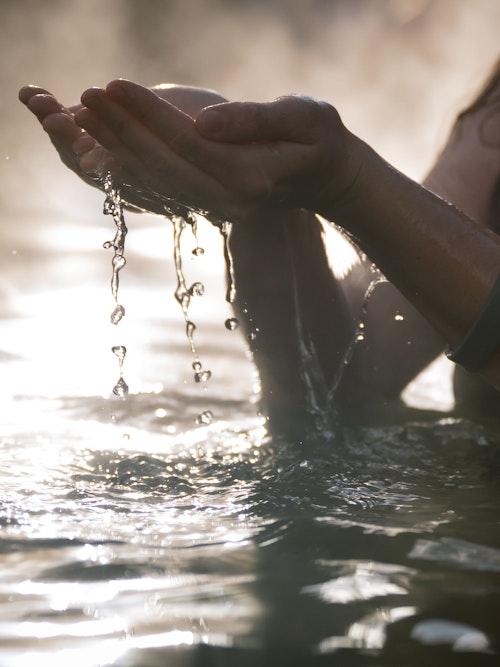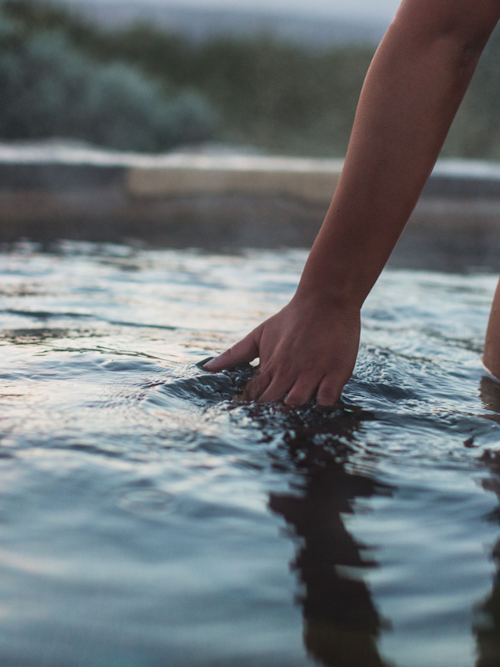October 20, 2022
wellness edit | the health and healing benefits of bathing in hot springs
Written by Jane
“There must be quite a few things a hot bath won't cure,” Sylvia Plath once wrote, “but I don't know many of them.”
For Dr Marc Cohen, a medical doctor and university professor, one of the most memorable bathing experiences involves a family trip to New Zealand’s Maruia Hot Springs about 20 years ago. At the time, it was “being run as a quirky little onsen” and Cohen decided to take a solo bathe after dinner one night.
“I remember being in nature, in the snow, in hot water, under a full moon, just revelling and feeling super comfortable and at one with everything,” he says.
Aside from granting him that “peak experience”, Cohen’s exposure to mineral bathing has inspired a decades-long fascination with researching the precise magic behind why hot springs are so profoundly relaxing. Anyone who’s immersed themselves in a hot spring knows this effect: it’s the one where you emerge from the water feeling as if you could float home.
Studies by Cohen and others have revealed a raft of benefits that include everything from better sleep and cardiovascular health to reduced pain and inflammation. Much of the research also demonstrates a strong link between hot spring bathing and mental health.
So, what exactly happens to us when we bathe in hot springs?
According to Cohen, there are multiple factors at play. One is that our blood vessels dilate when in a heated environment, which encourages circulation and increases our heart rate.
“People don't realise that when they’re just relaxing in a hot spring, they’re actually exercising,” says Cohen. “And that’s actually a really good way for some people to get exercise… They can just sit in a sauna or a hot bath and get a really good cardiovascular workout.”
This, in turn, promotes relaxation and sleep. It also promotes lymphatic drainage through the body (as long as we drink plenty of water).
Then, there are the minerals. Depending on where you’re bathing, natural hot springs contain a collection of minerals such as magnesium, calcium, phosphate, chloride and potassium, which each have their own unique benefits. Magnesium, for example, can enhance sleep and skin health.
Cohen believes that the nature component also plays a role — not just because of the psychological enjoyment of being in a “green” space, but scientific studies show that we experience an increase in immune-boosting natural killer cells thanks to the specific essential oils emitted by our botanical friends.
Psychologist, sleep specialist and RMIT University lecturer Russell Conduit is one of the researchers currently trying to crack the code on why so many hot springs guests report sleeping more soundly after bathing.
Conduit says that while there is some research to suggest that a warm bath before bed helps you sleep, this doesn’t fully explain the hot spring phenomenon seen in his studies.
"These were people that would do bathing during the day and have better sleep at night. So it was obviously more than just simple water temperature. There’s something else going on. And that’s what sparked my interest.” he says.
Conduit and fellow researchers (including Cohen and PhD student, James Clark-Kennedy) are exploring whether improved sleep can be attributed to factors such as the social aspect of bathing, the minerals, the general environment, the fact that people are taking time out from their busy lives — or a combination.
In Brisbane, naturopath, lecturer and PhD student Elizabeth Greenwood has spent years studying both the history and benefits of balneotherapy, which has been prescribed for all kinds of ailments throughout the ages (including in her native England).
“I’d really like to… bring back therapeutic bathing as a recognised therapeutic intervention,” she says. “And so I’ve been studying it for many years and just finally committed to doing a PhD in the area to help validate the therapeutic effects of it.”
Through her practice at Holistic Studio, Greenwood prescribes baths for conditions such as fluid retention, chronic pain, period pain, musculoskeletal injuries and stress. Usually she will also suggest a tailored concoction of minerals or herbs to add to the water.
Greenwood’s clients report reduced pain and better range of motion, and her research reveals a reduction in inflammatory markers in the blood tests of subjects who have regular baths.
In addition to balneotherapy, contrast therapy, which involves alternating between hot and cold environments, has been practised in European countries such as Finland for centuries.
Cohen explains that when combined with the vasodilation of heat therapy, the vasoconstrictive effect of cold environments further encourages lymphatic flow and healthy, elastic blood vessels. As a general contrast therapy protocol, Cohen recommends going from hot to cold, resting (in a thermoneutral setting), and then repeating.
Emma Pennisi, an exercise physiologist, offers contrast therapy to clients at her Byron Bay gym, Alter Training, by way of an infrared sauna and icy cold pool. She recommends the sauna to those wanting to bolster the cardiovascular effects of their gym workout or to aid recovery.
“After strength training in particular… they’ll jump in the sauna, because it’s shown to improve human growth hormone, which promotes recovery,” says Pennisi.
Regular cold therapy, meanwhile, helps increase our “brown” fat (as opposed to the less healthy “white” fat), which can assist with weight loss. Pennisi says the ice bath is popular among clients wanting to lose weight, but also those looking to enhance their mental resilience.
“A lot of them do it for mental health, or to de-stress,” she explains. “The idea is that when you do hard things with your body it… releases dopamine, which is the precursor to endorphins, and that’s your happy hormone. And it also decreases your cortisol levels, which is a stress hormone.”
Pennisi adds that while there are optimal temperatures and durations for practising contrast therapy, in the end it’s about finding your personal edge and building up a tolerance.
Naturally, there are some conditions (such as high blood pressure, certain skin issues and pregnancy) where bathing or contrast therapy may not be recommended.
And for those not wanting to push themselves, the practice of simply sitting in a warm hot spring — even for short bursts of time — still offers enormous benefits.
“You’ve distressed, you’re out in nature, you’ve had a nice social experience, your body’s relaxed, and all your stress hormones can come back into balance. Your immune system can sort of recalibrate,” says Cohen. “And suddenly you’ve actually got more ability to cope with the hazards of life… Having that relaxing bath in nature is part of finding that still point in your week or month.”
discover our water
"We rejuvenate and renew through relaxation, movement, nutrition, sleep, mindfulness, creativity and being at one with nature" - Charles Davidson
Learn more of the healing benefits of our water
our water story


